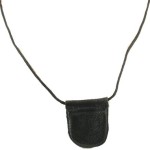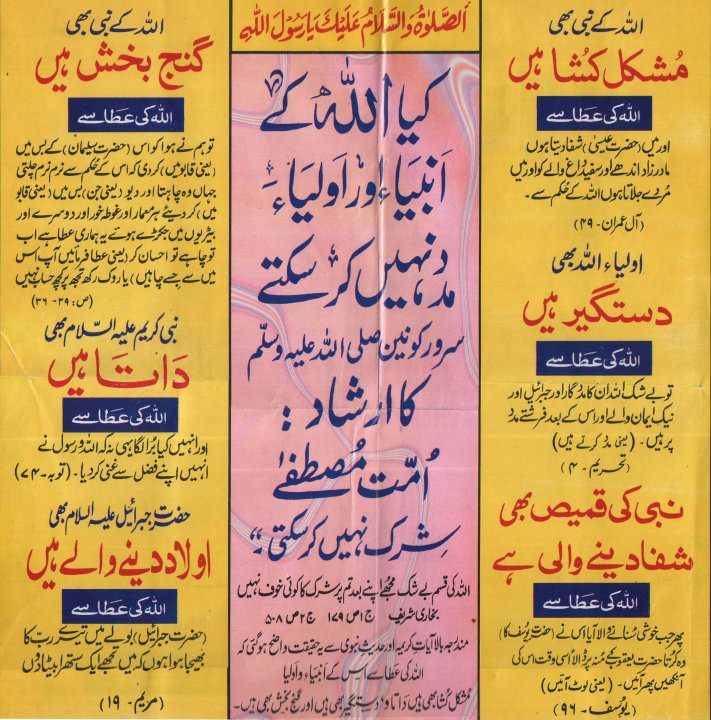Taweez allowed in Islam(English)
Please read the complete article .
We also have Fatwa of Sheikh Ibn Taymiah on this issue , for our wahabi friends.
The definition of a taweez is simply a written du’a from the Qur’an or ahadith, and is for the one who cannot read or has not memorized that particular du’a. It is written on a piece of paper and is worn around the neck.
We, the Ahl as-Sunna, believe that to wear a taweez around the neck is permissible if the du’a’ contained in it is written from the Qur’an or ahadith. Prophet Muhammad (may Allah bless him and grant him peace) used to recite du’a’ and then blow onto the sick person. The Companions of the Prophet (may Allah bless him and grant him peace) also did this and they wrote the du’a’ on a piece of paper and placed it around the neck of a person if they could not read it. Of course, the du’a’s from the Qur’an and ahadith have the power to heal the sick. Some people say that if you wear the tawiz you are commiting shirk, but we shall prove, with the help of Allah, that it is permissible to wear a tawiz/amulet.
The Qur’an Has the Power of Healing
Allah Most High says in the Qur’an:
“…We send down in Qur’an that which is a healing and a mercy to the believers…”
[Sura Banu Isra’il, verse 82]
Qadi Shawkani writes,“If the Qur’an’s du’a’s are recited and blown on the sick, they will be cured.When the non-believers recite the Qur’an, their blasphemic disease will be cured”
[Tafsir Fath al-Qadir, under Sura Bani Isra’il, verse 82]
Hafiz Ibn Kathir and Qadi Shawkani write:
“Amr ibn Shu’aib (may Allah be pleased with him) said that ‘Rasulu’llah(may Allah bless him and grant him peace) taught my father and grandfather a du’a which we would read before going to sleep, to protect us from fear and anguish.We told our elder children to recite this du’a before going to sleep as well.But for those children who were not yet literate, we would write it and then put it around their necks”
[Musnad Ahmad ibn Hanbal vol.2; Abu Dawud, in ‘Chapter of Medicine’; Tafsir Ibn Kathir, under Sura al-Mu’minun, verse 97; and Qadi Shawkani, Fath al-Qadir, under the same verse]
It is Permissible to Read Du’a and Blow Upon the Sick
Imam al-Bukhari and Imam Muslim write:
“When a person who was sick or in some distress they would go to the Prophet (may Allah bless him and grant him peace) who would then place his hand on the area of pain and recite a du’a’ and then blow onto him”
[Bukhari; Muslim, Chapter of Tibb]
Imam Muslim writes:
“When the Prophet (may Allah bless him and grant him peace) was ill for the last time,Angel Jibril (peace be upon him) came and recited du’a’ and blew on to the Prophet (may Allah bless him and grant him peace)”
[Muslim, Chapter of Tibb]
Imam Muslim writes:
” ‘A’isha (may Allah be pleased with her) relates that when the Prophet (may Allah bless him and grant him peace) was ill for the last time, she recited Sura al-Falaq and Sura an-Nas and then blew on to the Prophet’s (may Allah bless him and grant him peace) hands. The Prophet then blew this onto his own face and body because his hands had more blessing then ‘A’isha’s (may Allah be pleased with her)”
[Muslim, Chapter of Tibb]
From the above narrations, it proves that to blow after reciting du’a’s onto the sick is Sunna and the more pious the person is, the more healing power he has because he is blessed more than the less pious.
Hafiz Ibn Taymiyya writes:
“It is permissible to [to recite du’a’s and then] blow upon the sick in Islam, but the words must be from the Qur’an or ahadith. If the words are not, then it is not permissible”
[Ibn Taymiyya, At-Tawassul, Chapter on Blowing onto the Sick]
Questions
Q) Some people ask, ‘How is it allowed to blow dua’s onto the sick when some ahadith say this is forbidden?’
Answer
A) Allama Sa’idi has written the answer to this question in great detail; he has also included the opinion of all the other great scholars, and we will present this here.
Allama Sa’idi writes:
“Imam an-Nawawi in Sharh Muslim states: ‘There are two types of ahadith concerning blowing. [reciting a du’a and then blowing onto a person]. One of the types is transmitted in Bukhari: ‘There will be people who will enter Paradise without any questioning, who have never been blown upon.’ Imam Muslim has also recorded a hadith in support of those who do not ask to be blown upon. Imam Bukhari in the chapter on Tibb [Medicine] has written du’as that our Prophet (may Allah bless him and grant him peace) recited when doing damm [reciting a du’a and then blowing onto a person]. Imam Muslim states in ‘The Chapter on Virtues of the Prophet (may Allah bless him and grant him peace)’ that: “When our Prophet (may Allah bless him and grant him peace) was ill, the Angel Jibril came to him and performed the blowing.” The above types of ahadith apparently seem to contradict each other but in reality there is no contradiction.
“The former type of hadith refers to the prohibition of having read something that is not from the Qur’an and Sunna [i.e.something that has pictures, diagrams or words not from the Qur’an or Sunna] and then blow upon someone. The latter types of ahadith which permit damm refer to those kalimat [words or verses] which have been taught by the Prophet (may Allah bless him and grant him peace)”
[Allama Sa’idi, Sharh Sahih Muslim, Chapter of Tibb]
In the same way as above there are two types of ahadith concerning taweez. There are many narrations that forbid the use of tawiz and also many permitting their use.
Imam al-Qurtubi wrote in detail about both types of ahadith concerning taweez:
“The taweez that are forbidden are those taweez / amulaets from the Time of Ignorance – ]those which are satanic and contain an element of shirk [mantar, voodoo and magic, etc.]. The ta’wiz, which are permitted are those written with du’as evidently from Qur’an and ahadith only”
[al-Qurtubi, at-Tadhkirat, chapter on ‘Ta’wiz’]
Here are the narrations which show the permission for one to wear a ta’wiz around one’s neck:
Allama Alusi al-Hanafi, in his Tafsir of the Qur’an, writes:
“According to Imam Malik ‘It is permitted to put around the neck the ta’wiz written with the name of Allah.’ Imam Baqir also stated that it is permitted to put such a ta’wiz around the neck of a child”
[Ruh al-Mani, chapter 15, under Sura al-Mu’minun, verse 97]
Allama Shami al-Hanafi writes:
“It is permitted to write a ta’wiz and put it around the neck… It would be better if a person recites the du’as taught by the Prophet (may Allah bless him and grant him peace).But if a person cannot read or is too young to recite then it is permitted for that person to put it around the neck”
[Rad al-Mukhtar, chapter on ‘Qira’at’; Sa’idi, Sharh Sahih Muslim, Chapter on Tibb]
To conclude, it can be said that those verses that oppose the Qur’an, Shari’a, or the Sunna are forbidden to read and also forbidden to put around the neck.But as for the du’as and verses from the Qur’an and Sunna it is permitted to be written and put around the neck of a small child, illiterate or a sick person.
Imam Ibn Taymiyya writes in his Fatawa: (taweezes).
In the name of Allah, Most Compassionate, Most Merciful,
Hanging or wearing of amulets (taweez) is normally permissible for protection or healing provided certain conditions are met:
1) That they consist of the names of Allah Almighty or his attributes;
2) That they are in Arabic;
3) That they do not consist of anything that is disbelief (kufr);
4) The user does not believe the words have any affect in themselves, but are empowered to do so by Allah Most High.
It is narrated from Amr ibn Shu’ayb, from his father, from his grandfather (Abdullah ibn Amr ibn al-Aas (Allah be pleased with them all), that the Messenger of Allah (Allah bless him & give him peace) used to teach them (the Sahabas) for fearful situations the following words:
“I seek refuge in Allah’s perfect words from His wrath, the evil of his servants, the whispered insinuations of devils, and that they come to me”
Abd Allah ibn Amr used to teach these words to those of his sons who had reached the age of reason,[COLOR=”Red”] and used to write them and hang them upon those who had not reached the age of reason[ /COLOR]
(narrated by Abu Dawud & Tirmidhi, and Tirmidhi classed it as an authentic narration).
In the Musannaf of Imam Abu Bakr ibn Abi Shayba, the permissibility of hanging Ta’wizes is reported from many of the Companions and early Muslims (Salaf), including: Sa’id ibn al-Musayyab, Ata’, Mujahid, Abd Allah ibn Amr, Ibn Sirin, Ubaydullah ibn Abd Allah ibn Umar, and others (Allah be well pleased with them all). [See: al-Musannaf, 5.439].
Due to the above, most of the scholars have declared the using of amulets (ta’wiz) permissible as long as the above conditions are met. It is similar to using medication which is permissible and not against the concept of reliance in Allah (tawakkul) or monotheism Tawhid. However, it is not permissible to regard the Ta’wiz to be effective in it self, just as it is not permissible to regard medicines to be effective in them selves.
As for that which is reported from some, including Ibn Mas’ud (Allah be pleased with him), that hanging Ta’wizes is shirk, this is understood to mean those Ta’wizes that resemble the one’s used in the days of ignorance (jahiliyya), or if used thinking that it is the ta’wiz itself that cures or protects, not Allah, or if it contains impermissible invocations or one’s whose meaning is not known.
Imam Ibn Taymiyya (Allah have mercy on him) writes in his Fatawa:
“It is permissible for an ill or troubled person, that certain verses from the Qur’an are written with pure ink, then it is washed and given to the ill to drink.Ibn Abbas (Allah be pleased with him) is reported to have mentioned a certain Dua that should be written and placed close to the woman who is experiencing hard labour at the time of giving birth.
Sayyiduna Ali (Allah be pleased with him) says: This Dua should be written and tied to the arm of the woman. We have experienced that there is nothing more amazing than this” (Fatawa Ibn Taymiyya, 19/65).
Imam Ibn Taymiyya’s student Imam Ibn al-Qayyim also narrates the permissibility of using Ta’wizes from a number of salafs including the great Imam Ahmad ibn Hanbal (Allah have mercy on him).Thereafter Ibn al-Qayyim himself quotes various Ta’wizes (Zad al-Ma’ad, 3/180).
In view of the foregoing, it becomes clear that generally using of Taweezes is not something that is impermissible or Shirk. However, it is necessary that the above mentioned conditions are met.
Today we have people who are victims of immoderation. There are some people who declare all types of Ta’wizes to be Shirk and Kufr.  Others, on the other hand, think Ta’wizes to be everything. Both these types of understandings are incorrect.
Others, on the other hand, think Ta’wizes to be everything. Both these types of understandings are incorrect.
Using of Ta’wizes is permissible, but with moderation. Normally it is better to recite the Duas which are prescribed for every problem and illness, and along with that resort to medical treatment. However, if Ta’wizes are used sometimes, then it is permissible.
If there is a fear that a person will begin to think the Ta’wiz to be effective in it self, then he should not be given the Ta’wiz. This will be the decision of the person who is giving the Ta’wiz, and not for us to decide for him.
There are many people who never make Dua and are neglectful of the Shariah injunctions, but always depend on Ta’wizes. For such people, it is better not to give them Ta’wizes, rather to direct them to the straight path.
Once, a sister asked me(Who Creates the Proofs and i copy n paste here from his blog)( Not me haan) to mention to her a Dua or write something for her in order to get married to someone she desired, and she also mentioned that her Duas were not being answered.I asked: “Do you cover your self when you emerge out of your home?” no, was the reply. I said: “Do you perform your Salat (Prayers)?” Again, “no” was the reply. I said: “From tomorrow, you make this special Dua after the Fajr Salat, and you carry on performing this for 6 months, and Insha Allah your Dua will be accepted. Also a very Important Ta’wiz is that you recite a certain Dua and blow on your scarf and wear that scarf when emerging out of your home”!
to mention to her a Dua or write something for her in order to get married to someone she desired, and she also mentioned that her Duas were not being answered.I asked: “Do you cover your self when you emerge out of your home?” no, was the reply. I said: “Do you perform your Salat (Prayers)?” Again, “no” was the reply. I said: “From tomorrow, you make this special Dua after the Fajr Salat, and you carry on performing this for 6 months, and Insha Allah your Dua will be accepted. Also a very Important Ta’wiz is that you recite a certain Dua and blow on your scarf and wear that scarf when emerging out of your home”!
In conclusion, generally it is permissible to use amulets (ta’wizes) in compliance with the conditions mentioned above. However, if there is something that is impermissible, then it will not be allowed.
عَنْ عَبْدِ اللَّهِ ، قَالَ: قَالَ رَسُولُ اللَّهِ: «عَلَيْكُمْ بِالشِّفَاءَيْنِ: الْعَسَلِ وَالْقُرْآنِ
Translation: Narrated by Abdullah Ibn Masud (ra) that the Prophet (Peace be upon him) said: Make use of the two cures i.e. the honey and Quran [Sunnan Ibn Majah Volume No.2, Hadith No. 3531]
Imam Ibn Hajr al-Asqalani (rah) said about this hadith:
أخرجه ابن ماجه والحاكم مرفوعاً، وأخرجه ابن أبي شيبة والحاكم موقوفاً، ورجاله رجال الصحيح
Translation: It is narrated by Ibn Majah and Hakim in the Marfu form. It is also narrated by Ibn Abi Shaybah and Hakim in the Mawquf form. The men of these ahadith are those of Sahih [Fath ul Bari, Sharh Sahih ul Bukhari (11/321)]
Ibn Qayyim al Jawziyyah says:
Some of our rightly guided ancestors stated that there is no harm if some ayat (Verse) from the Qur’an were written in ink and then washed with water and that the sick person drinks that water. Mujahid issues a statement to that effect and so did Abu Qilabah. It was also reported that Ibn ‘Abbas once commanded that two verses from the Qur’an to be written for a woman who had hard pregnancies and that the verses were then washed with water and she was to drink the water. Also Ayub said, “I saw Abu Qilabah write some Verses from the Qur’an wash it with water and then give the water to a person who was suffering from some type of illness to drink it [Tibb an Nabawi by Ibn Qayyim, Page No. 154, English version]
In the Musannaf of Abu Bakr ibn Abi Shayba, the permissibility of hanging a ta`wiz is reported from many of the Companions and early Muslims (Salaf), including:
حدّثنا أبو بكر قال حدثنا عقبة بن خالد عن شعبة عن أبي عصمة قال: سألت سعيد بن المسيب عن التعويذ فقال: لا بأس إذا كان في أديم.
حدّثنا أبو بكر قال حدثنا يحيى بن آدم قال حدثنا حسن عن ليث عن عطاء قال : لا بأس أن يعلق القرءان
Translation: It is narrated that Sa’eed bin Musayb (one of the top ranking Tabi’i) was asked about wearing Amulets, he said: There is “No harm in doing so”
Imam al Ata (rah) the Tabi’i and Faqih of Makkah said: There is no harm in hanging (ayahs of) Quran (around the neck) [Musannaf Ibn Abi Shaybah, Volume No. 5, Page No. 439]
Mujahid, Abd Allah ibn `Amr, Ibn Sirin, `Abayd Allah ibn Abd Allah ibn `Umar, and others (Allah be well pleased with them all) also narrated it [Musannaf, 5.439]
,
Amr ibn Shu’ayb reported from his father, from his grandfather that Allah’s Messenger (SAW) said, “If any of you gets a nightmare, let him say:
I seek refuge in the perfect words of Allah against His wrath and His punishment and the’ mischief of His slaves and from the temptations of the devils and that which they bring.
Then they will not harm him.” So, Abdullah ibn Amr used to teach this supplication to his grown up children. And, he wrote it down on something and hung it on the neck of those who had not attained puberty.
[Abu Dawud 3893 ,sunan tirmidhi Chapter 99, hadith 3539]
أَبُو دَاوُدَ وَالنَّسَائِيُّ وَالْحَاكِمُ وَقَالَ صَحِيحُ الْإِسْنَادِ
Abu Dawood [rah], Nasai [rah] and Al Hakim [rah] said the Isnad is SAHIH
And
قال أبو عيسى هذا حديث حسن غريب
Imam Tirmidhi after quoting it said: Abu Esa [rah] said the Hadith is Hasan Gharib





